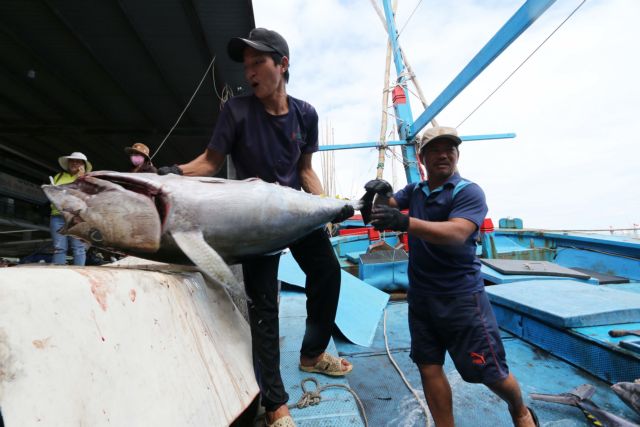 Economy
Economy


|
| Fishermen catch a tuna in Khánh Hòa Province. Israel imported US$36.6 million of Vietnamese tuna last year. — VNA/VNS Photo Đặng Tuấn |
HÀ NỘI — The trade deal would create a conducive atmosphere for the export of Vietnamese products to Israel and soon bring bilateral trade to US$3 billion.
That was the comment of expert Đinh Trọng Thịnh on the Vietnam-Israel Free Trade Agreement, which was signed on Wednesday after seven years of negotiations.
"The deal presents stellar opportunities for Vietnamese producers to drive substantial cost savings and gain competitive advantages through access to Israeli high-tech sectors," Thịnh said.
Vietnamese tropical products will also have the scope to serve as an essential link in Israeli supply chains.
"Israel needs imports from tropical countries like Việt Nam to fuel its processing industry," said Thịnh.
But Vietnamese producers still have a lot of work to do to get there, given that merely 30 per cent of them have managed to use FTAs to their advantage.
Trade authorities, he said, could use communication and education tools to get more producers well-informed about VIFTA.
According to expert Ngô Trí Long Israel is not self-sufficient in consumer goods and depends highly on imports. The country imports US$35 billion for consumption annually, indicating large potential demand for Vietnamese exports.
The deal will open up opportunities for Việt Nam to turn the potential demand into real revenue. With VIFTA, bilateral trade is expected to rise to $3 billion soon, from $2.6 billion in 2022.
"Việt Nam currently has around 70 exportable products to Israel. Room for commercial growth is ample," said Long.
Long called on Vietnamese producers to read up on trade rules in Israeli markets to fully exploit the deal. He said market research and trade promotion would also serve producers well in that regard.
"Food safety should be top of mind when bringing products to Israeli markets," he added.
Trương Đình Hòe, Secretary-General of the Vietnam Association of Seafood Exporters and Producers, said the deal would bring Việt Nam's exports to new heights thanks to Israel's great demand for its seafood.
In fact, Israel had always been among the 30 largest importers of Vietnamese seafood, consuming $36.6 million of tuna, $23.2 million of squid, and $21 million of shrimp in 2022.
"Vietnamese seafood has won favour with Israeli consumers over the years. The deal will push the advantage further by phasing out tariffs," said Hòe.
Expert Vũ Vinh Phú said the deal would give a big push to Việt Nam's exports to Israel, making bilateral trade more balanced and equitable. Current bilateral trade is skewed in favour of Israel.
He called on Việt Nam's trade offices to assist producers in business matching to help them avoid scams in trade. — VNS




